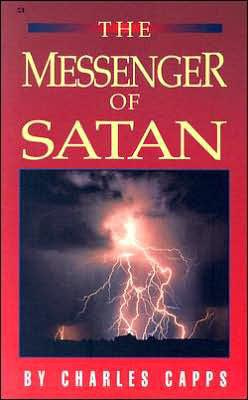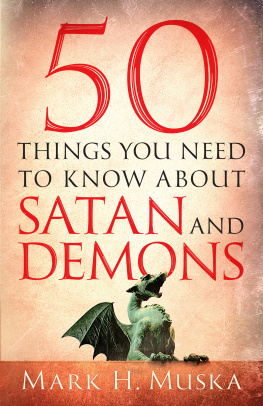The Fall of Satan
Rebels in the Garden
Bodie Hodge
Copyright Information
First Printing: March 2011
Copyright Bodie Hodge. No part of this book may be used or reproduced in any manner whatsoever without written permission of the publisher, except in the case of brief quotations in articles and reviews. For information write:
Master Books, P.O. Box 726, Green Forest, AR 72638
Master Books is a division of the New Leaf Publishing Group, Inc.
ISBN 13: 978-0-89051-606-5
Library of Congress Number: 2011920854
Unless otherwise noted, all Scripture is taken from the NKJV (New King James Version, copyright 1982 by Thomas Nelson, Inc. Used by permission. All rights reserved). Scripture in chapter 35 is from the NASB (New American Standard Bible, copyright 1960, 1962, 1963, 1968, 1971, 1972, 1973, 1975, 1977, 1995 by the Lockman Foundation. Used by permission).
Please consider requesting that a copy of this volume be purchased by your local library system.
Printed in the United States of America
Please visit our website for other great titles:
www.masterbooks.net
For information regarding author interviews,
please contact the publicity department at (870) 438-5288.
Acknowledgments
Special thanks to the many reviewers and editors for chapters included in this book: Steve Fazekas, Dr. Terry Mortenson, Dr. Andrew Snelling, David Jolly, David Wright, Gary Vaterlaus, Stacia McKeever, Dr. Jason Lisle, Dr. Tommy Mitchell, Frost Smith, Tim Chaffey, Erik Lutz, Jeremy Ham, Donna ODaniel, Dr. Georgia Purdom, John Upchurch, Lori Jaworski, Paul F. Taylor, and Ken Ham.
Also a special thanks to Professor Andy McIntosh for his contribution to the chapter on defense/attack structures, which is reprinted from The New Answers Book and to Dan Lietha for providing the bulk of the artwork.
Contents
Foreword
... lest Satan should take advantage of us; for we are not ignorant of his devices (2 Corinthians 2:11).
The reality of Satan and his work, specifically in the Garden of Eden, has spawned numerous questions that Christians have been struggling to answer. In a scientific age, many Christians wonder if Genesis can even be trusted. Often, they simply avoid these questions. But should we as Christians shy away from answering? Absolutely not, for we are not ignorant of Satans devices.
Some of the most common questions asked at Answers in Genesis and to the church as a whole, next to evolution and millions of years, relate to Satan, the origin of sin and evil, and the Fall of man in general. On average, the ministry receives about five to ten questions per week on this topic alone! So there was a real need to get these answers out as well.
To be answered properly, many questions must go back to the Curse in Genesis 3 and other early chapters in Genesis. This is exactly what Bodie Hodge has done as he dives into the Scriptures to answer some tough questions. Such questions are having an impact, but few realize how important these questions are. They are, in fact, the very foundation for the Gospel. It was the Fall of man (Adam and Eve) that put us into a bind... that required a Savior Jesus Christ.
Satan and the origin of evil are hot topics in todays culture because the world is attacking the reality of Satan and claiming that evil doesnt even exist. And the Church, by and large, has few lay biblical resources on the subject to counter such claims. Rarely do resources take questions like these back to the Curse in Genesis 3 and make them relevant today. Yet this book does both.
Christians can give easy-to-read, reasoned, biblical answers to help strengthen their faith and share with others. So this general apologetics book should be an excellent resource that looks closely at the bad news in Genesis but also shares the powerful good news of Jesus Christ and His sacrifice that has conquered sin, Satan, and evil once for all.
Introduction
Each question answered in this book is a genuine question that has been asked many times over. These and similar questions are valid questions to ask. To answer them, we need to carefully consider what the Bible says, since it is the only completely reliable source of information about Satan. The Bible doesnt give much information about Satan and angels, since it was written to man, but it does give enough to reasonably answer some of these questions.
Gods Word is infallible and the absolute authority and we need to be leery of absolute conclusions drawn from sources outside the Bible, such as mans ideas or traditions.
Chapter 1
Who is Satan and was he always called Satan?
The first use of the name Satan is found in 1 Chronicles 21:1; chronologically, this is surpassed by Job, which was written much earlier. Satan is found throughout Job chapters 1 and 2. Satan (satan) literally means adversary in Hebrew. The etymology of the name is discussed briefly by Justin Martyr, an early church father, around A.D. 156. He says:
Or He meant the devil by the lion roaring against Him: whom Moses calls the serpent, but in Job and Zechariah he is called the devil, and by Jesus is addressed as Satan, showing that a compounded name was acquired by him from the deeds which he performed. For Sata in the Jewish and Syrian tongue means apostate; and Nas is the word from which he is called by interpretation the serpent, i.e., according to the interpretation of the Hebrew term, from both of which there arises the single word Satanas.
Another name appears in the Old Testament in the King James Version:
How art thou fallen from heaven, O Lucifer, son of the morning! How art thou cut down to the ground, which didst weaken the nations! (Isaiah 14:12; KJV).
This is the only passage that uses the name Lucifer to refer to Satan. This name doesnt come from Hebrew but Latin. Perhaps this translation into English was influenced by the Latin Vulgate, which uses this name. In Latin, Lucifer means light bringer.
The Hebrew is heylel and means light bearer, shining one, or morning star. Many modern translations translate this as star of the morning or morning star. In this passage, heylel refers to the king of Babylon and Satan figuratively. Of course, Jesus lays claim to this title in Revelation 22:16. Though the passage in Revelation is in Greek while the passage in Isaiah is Hebrew, both are translated similarly.
Some believe that Lucifer was a heavenly or angelic name that was taken from Satan when he rebelled. The Bible doesnt explicitly state this, though Satan is nowhere else referred to as Lucifer but instead is called other names like the devil, Satan, etc. This tradition may hold some truth, although the idea seems to miss that this verse is referring to him during and after his fall not before. Since other scriptural passages refer to him as Satan, Lucifer wasnt necessarily his pre-Fall name any more than Satan would be.
Even though Satan is first mentioned by name in Job, previous historical accounts record his actions. See Genesis 3 when Satan influenced the serpent, in Genesis 4 and 1 John 3:12 where Cain belonged to him when he slew his brother, and in Revelation 12:9.
In the New Testament, other names reveal more about Satans current nature. Devil (diabolos) means false accuser, Satan, and slanderer in Greek, and is the word from which the English word diabolical is formed. Satan is called dragon in Revelation 12:9 and Revelation 20:2, as well as the evil one in several places. Other names for Satan include ancient serpent/serpent of old (Revelation 12:9), Abaddon (destruction), Apollyon (destroyer) (Revelation 9:11), Beelzebub/Beelzebul (Matthew 12:27), Belial (2 Corinthians 6:15), and tempter (Matthew 4:3).














